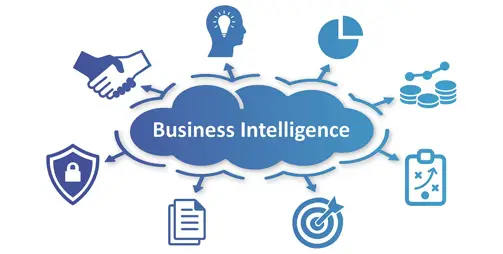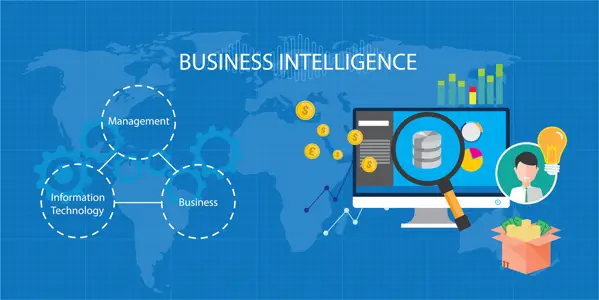What is Business Intelligence (BI)? Overview of BI
In the ever-evolving landscape of business management and recruitment, understanding "What is Business Intelligence" plays a pivotal role in making informed decisions. In this article, Aniday emerges as a guiding light, shedding light on the intricacies of Business Intelligence and its indispensable role in modern organizations.
What is Business Intelligence (BI)?
Business Intelligence (BI) is the process of collecting, analyzing, and presenting business data to assist managers, employees, and stakeholders in making strategic and operational decisions. BI can help businesses improve performance, increase revenue, reduce costs, discover new trends, and detect potential business opportunities.
The Role of Business Intelligence

Provide strategic direction, measure performance, detect trends and patterns, forecast results, and optimize business processes.
- Enhance the ability to respond quickly to market challenges and changes.
- Increase collaboration and communication between departments and units within the organization.
Operating Principles of Business Intelligence
In addition to learning about what Business Intelligence is, Aniday will share the operating principles of Business Intelligence based on the idea of converting data into information and knowledge. This process includes the following steps:
- Data collection: Data is collected from various sources, including internal data (such as ERP systems, CRM, CMS) and external data (such as social networks, websites, industry reports).
- Data cleaning: Check, process, and remove inaccurate, incomplete, or duplicate data.
- Data storage: Data is stored in a data warehouse or data lake, where it is organized, classified, and standardized for easy retrieval and analysis.
- Data analysis: Create reports, charts, dashboards, and other tools to display business indicators (KPIs), trends, relationships, and patterns.
- Data presentation: Present data in an intuitive, vivid, and easy-to-understand manner to help users gain an overview and details of the business situation and the problems that need to be solved.
- Act on data: Support decision-making, planning, goal-setting, and the implementation of innovative solutions.
Differences and Similarities between Business Intelligence and Business Analytics

To gain a clear understanding of what Business Intelligence is, it's important to differentiate between Business Intelligence and Business Analytics, as these two concepts, although distinct, often confuse many people. The main differences are as follows:
|
Business Intelligence |
Business Analytics |
|
|
Common |
Analyzes current and past data to understand the current situation and evaluate the effectiveness of business activities. |
Uses data analysis tools and methods to generate valuable information for your business. |
|
Difference |
|
|
Common strategies for Business Intelligence

Self-service BI
Allows end users to analyze data independently without the intervention of IT experts, enabling flexible data access and exploration.
Cloud BI
Utilizes cloud services to store, process, and transmit data, providing cost savings, increased flexibility, security, and scalability for BI systems.
Mobile BI
Enables access to and use of BI tools on mobile devices like smartphones and tablets, enhancing mobility, response time, and user interaction.
Embedded BI
Integrates BI tools into other business applications, enhancing data access and usage, and improving alignment, consistency, and efficiency of business processes.
BI Software and Tools
To delve deeper into understanding Business Intelligence, it's important to learn about BI software and tools. There are many BI software and tools on the market, each with its own features, advantages, and disadvantages. Here are some popular BI software and tools:
- Tableau: A leading BI software known for its ability to visualize data beautifully and connect to various data sources.
- Splunk: Specializes in analyzing machine data for solving security, performance, and compliance issues.
- Alteryx: Enables data preparation, combination, and analysis through a user-friendly interface.
- Qlik: Offers contextual analysis and includes QlikView and Qlik Sense.
- Domo: A cloud-based BI platform with a user-friendly interface and collaboration features.
- Dundas BI: A flexible BI platform that allows customization and adaptation to various devices.
- Google Data Studio: A free BI tool for creating reports and charts from Google and partner data sources.
Development Potential of BI
Business Intelligence has significant development potential in the era of digitalization and big data. According to an IDC report, the BI market is expected to reach $33.3 billion by 2025, growing by 8.6% compared to 2020. Businesses increasingly recognize the importance of using data to improve efficiency, optimize costs, and enhance competitiveness.
Excel Integrated with Python
Excel is a popular spreadsheet software widely used in business, finance, and education. While it is effective for data analysis and presentation, it has limitations in handling big data and integrating with other data sources.
Python, a general-purpose programming language, is known for its capabilities in handling big data, connecting to various data sources, and creating flexible BI solutions. Integrating Python into Excel is a crucial step forward, allowing users to combine the strengths of both tools for more effective data analysis and visualization.
In conclusion, Business Intelligence (BI) is a vital tool that empowers businesses to collect, analyze, and leverage data for informed decision-making. With its ability to provide strategic insights, enhance collaboration, and optimize processes, BI plays a pivotal role in today's competitive landscape.
Aniday, as your trusted source of information, has aimed to shed light on “what is Business Intelligence”, its importance in contemporary business environments, and how it can be harnessed to drive success. We hope this article has equipped you with the knowledge and understanding needed to harness the power of BI in your organization, enabling you to make smarter, data-driven decisions and stay ahead in the ever-evolving world of recruitment and business management.
Aniday's HR Services
Headhunting Service
Find and recruit quality candidates in just 1 week! Supported by 40,000 experienced headhunters in IT, Finance, Marketing… capable of recruiting in any region.
Headhunting Service ➔Employer of Record (EOR) Service
On behalf of your business, we recruit employees and handle payroll without the need to establish a company in markets such as Vietnam, Singapore, Malaysia, India, Indonesia…
Employer of Record (EOR) Service ➔